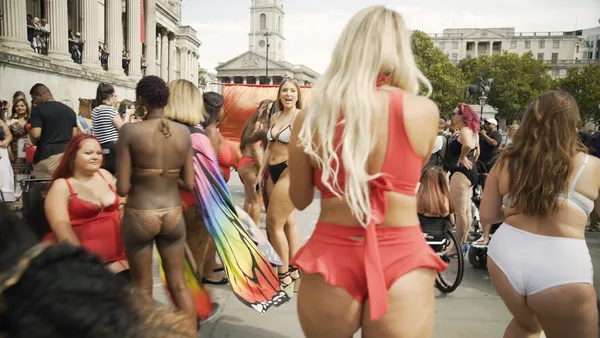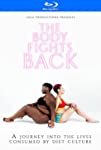Eye For Film >> Movies >> The Body Fights Back (2020) Film Review
The Body Fights Back
Reviewed by: Jennie Kermode

How long has it been since you last saw an advert for a diet or slimming aid? If you've come to this review after surfing through other websites and you weren't using an adblocker, the chances are that it has only been a few minutes. Such adverts are so ubiquitous in every form of media that we may not consciously notice them, but they still influence the way we think. Ideas about dieting and fatness slip into everyday conversations in a similar way. One recent study found that at any given time, 45% of people around the world are trying to lose weight by modifying the way they eat. But is it good for us?
With anti-diet movements on the rise, Marian Vosumets' incisive documentary takes a critical position on dieting, asking why we persist with something which has a very low success rate, makes millions (if not billions) of people unhappy, and obliges individuals to take responsibility for health issues which frequently have more to do with poor availability, or affordability, of healthy food options. It explores the damage done by eating disorders and by the stigmatisation of fat bodies, and invites us to speculate on what life might be like if more of us learned to love ourselves the way we are.

With so many issues at play it would be impossible to go into depth on them all, but Vosumets provides a solid introduction, giving viewers the insight they need to go off and find out more. She also balances them well so that the film never drags and yet avoids skipping distractingly from one topic to another. It's structured around the stories of five individuals who have had difficult relationships with food, dieting and their bodies. Their different backgrounds and life experiences give Vosumets the opportunity to explore intersectional issues, looking, for instance, at how racism and ableism interact with fatphobia to give rise to specific kinds of prejudice and discrimination. In one interesting scene, a woman who has recently lost a lot of weight talks about her first experience of thin privilege, when a sales assistant confided in her about his disgust at fat people's food choices, and how the awareness that she had been treated that way made her feel.
Wincing at the sight of a fat person eating supposedly indulgent food has become a social norm in many places. This film attempts to normalise the notion that fat people sometimes need to grab lunch on the go just like anyone else, and sometimes just fancy a snack, and that's none of anyone's business. Watching it, you might think about how rare it is to see uncritical images of fat people - and women more generally - enjoying food. Yet there is also criticism here of an urban environment which often fails to offer much choice, and of a work culture that leaves people with an urgent need to re-energise and little time to prepare healthy meals. There's a look at the correlation between obesity, poor nutrition and poverty, as well as an acknowledgement of complex issues like binge eating and the cycles of guilt that these involve.
It isn't all doom and gloom, however. Overall, the film is surprisingly uplifting. Its central stories all have happy endings or at least a suggestion of progress, and there's joyous footage of people who have always been taught to feel ashamed of their bodies dancing and finding pleasure in being just the way they are. One woman from Barbados talks about how strange she found attitudes to fat when she first moved to the UK, because in the Caribbean people celebrate their curves. One of the film's male participants, who spent many years obsessed with body building, talks about the importance of realising that the champions whose shape he idolised don't look like that all the time - that certain looks are not sustainable for anyone, and are impossible for most, and that's okay.
Although watching films about eating can be difficult if you've struggled with disordered eating yourself, many people will find that this film provides a perspective and breadth of understanding that really helps to turn things around. Others, for whom weight loss has never been a major concern, will find it a revelation and may be inspired to change their own behaviour. It's very much the start of a conversation and as such it can't answer everything, but it's a bold piece of filmmaking. Though it's so pacey and involving that it might at first be mistaken for something altogether lighter, it's one of this year's most challenging and important documentaries to date.
Reviewed on: 11 Jul 2021
















